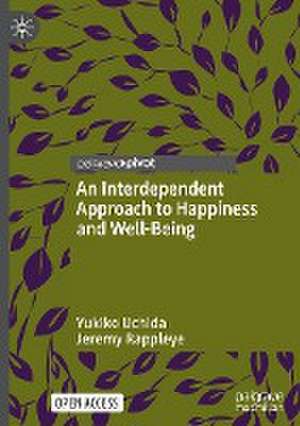An Interdependent Approach to Happiness and Well-Being
Autor Yukiko Uchida, Jeremy Rappleyeen Limba Engleză Hardback – dec 2023
Leading global organizations including the OECD, UNICEF, and UNESCO are now proposing human happiness and well-being as a more sustainable alternative to a myopic focus on GDP growth. Yet, the definition of well-being offered by these organizations derives largely from the philosophies, social sciences, and institutional patterns of Europe and the United States. Across seven chapters this book carefully probes the inadequacy of these approaches to well-being globally and reveals the distorting effect this has on how we imagine our world, organize institutions, and plan ourcollective future(s). It shares a wealth of evidence and examples from across East Asia - a region where interdependence remains foregrounded - and concludes by provocatively arguing that interdependence may provide a more sustainable approach to happiness and well-being in the 21st century. A timely and accessible book, it offers fresh insights for scholars and policymakers working in the areas of psychology, health, sociology, education, international development, public policy, and philosophy.
Preț: 235.26 lei
Nou
Puncte Express: 353
Preț estimativ în valută:
45.03€ • 48.93$ • 37.85£
45.03€ • 48.93$ • 37.85£
Carte tipărită la comandă
Livrare economică 21 aprilie-05 mai
Preluare comenzi: 021 569.72.76
Specificații
ISBN-13: 9783031262593
ISBN-10: 303126259X
Ilustrații: XV, 172 p. 38 illus.
Dimensiuni: 148 x 210 mm
Greutate: 0.38 kg
Ediția:1st ed. 2024
Editura: Springer International Publishing
Colecția Palgrave Macmillan
Locul publicării:Cham, Switzerland
ISBN-10: 303126259X
Ilustrații: XV, 172 p. 38 illus.
Dimensiuni: 148 x 210 mm
Greutate: 0.38 kg
Ediția:1st ed. 2024
Editura: Springer International Publishing
Colecția Palgrave Macmillan
Locul publicării:Cham, Switzerland
Cuprins
1. Introduction.- 2. Happiness: A World Map.- 3. Measuring Happiness, Making Policy.- 4. Culture and Happiness: An Interdependent Approach.- 5. An Interdependent Approach: Manifestations in Cultural Practices.- 6. Interdependence: Alternative for the Twenty-First Century?.- 7. Conclusion
Notă biografică
Yukiko Uchida is Professor at Kyoto University, Institute for the Future of Human Society, Japan. From 2019-2020, she was a Fellow at CASBS, Stanford University USA. After receiving her PhD in Social Psychology from Kyoto University in 2003, she worked as a visiting researcher at the University of Michigan and Stanford University. As a Cultural Psychologist, she studies the psychological mechanisms behind the experience of emotions like well-being.
Jeremy Rappleye is Associate Professor at Kyoto University, Graduate School of Education, Japan. He received his PhD in Education from the University of Oxford, and since 2012 has worked at Kyoto University in the division of Philosophical Pedagogy. His recent research centers on understanding how diverse institutional patterns (education) derive from different cultural worldviews, with particular focus on conceptualizations of self, (well-)being, and reality.
Jeremy Rappleye is Associate Professor at Kyoto University, Graduate School of Education, Japan. He received his PhD in Education from the University of Oxford, and since 2012 has worked at Kyoto University in the division of Philosophical Pedagogy. His recent research centers on understanding how diverse institutional patterns (education) derive from different cultural worldviews, with particular focus on conceptualizations of self, (well-)being, and reality.
Textul de pe ultima copertă
This open access book examines an interdependent approach to happiness and well-being, one that contrasts starkly with dominant approaches that have originated from Western culture(s). It highlights the diversity of potential pathways towards happiness and well-being globally, and answers calls - voiced in the UN’s Sustainable Development Goals - for more socially and environmentally sustainable models.
Leading global organizations including the OECD, UNICEF, and UNESCO are now proposing human happiness and well-being as a more sustainable alternative to a myopic focus on GDP growth. Yet, the definition of well-being offered by these organizations derives largely from the philosophies, social sciences, and institutional patterns of Europe and the United States. Across seven chapters this book carefully probes the inadequacy of these approaches to well-being globally and reveals the distorting effect this has on how we imagine our world, organize institutions, and plan our collective future(s). It shares a wealth of evidence and examples from across East Asia - a region where interdependence remains foregrounded - and concludes by provocatively arguing that interdependence may provide a more sustainable approach to happiness and well-being in the 21st century. A timely and accessible book, it offers fresh insights for scholars and policymakers working in the areas of psychology, health, sociology, education, international development, public policy, and philosophy.
Yukiko Uchida is Professor at Kyoto University, Institute for the Future of Human Society, Japan. From 2019-2020, she was a Fellow at CASBS, Stanford University USA. After receiving her PhD in Social Psychology from Kyoto University in 2003, she worked as a visiting researcher at the University of Michigan and Stanford University. As a Cultural Psychologist, she studies the psychological mechanisms behind the experience of emotions like well-being.
Jeremy Rappleye is Associate Professor at Kyoto University, Graduate School of Education, Japan. He received his PhD in Education from the University of Oxford, and since 2012 has worked at Kyoto University in the division of Philosophical Pedagogy. His recent research centers on understanding how diverse institutional patterns (education) derive from different cultural worldviews, with particular focus on conceptualizations of self, (well-)being, and reality.
Jeremy Rappleye is Associate Professor at Kyoto University, Graduate School of Education, Japan. He received his PhD in Education from the University of Oxford, and since 2012 has worked at Kyoto University in the division of Philosophical Pedagogy. His recent research centers on understanding how diverse institutional patterns (education) derive from different cultural worldviews, with particular focus on conceptualizations of self, (well-)being, and reality.
Caracteristici
Outlines a mode of well-being different from globally dominant European and American models Argues that an interdependent approach is a more sustainable, forward-looking pathway to well-being Draws together research on interdependence from cultural psychology, comparative sociology, philosophy, and education This book is open access, which means that you have free and unlimited access
